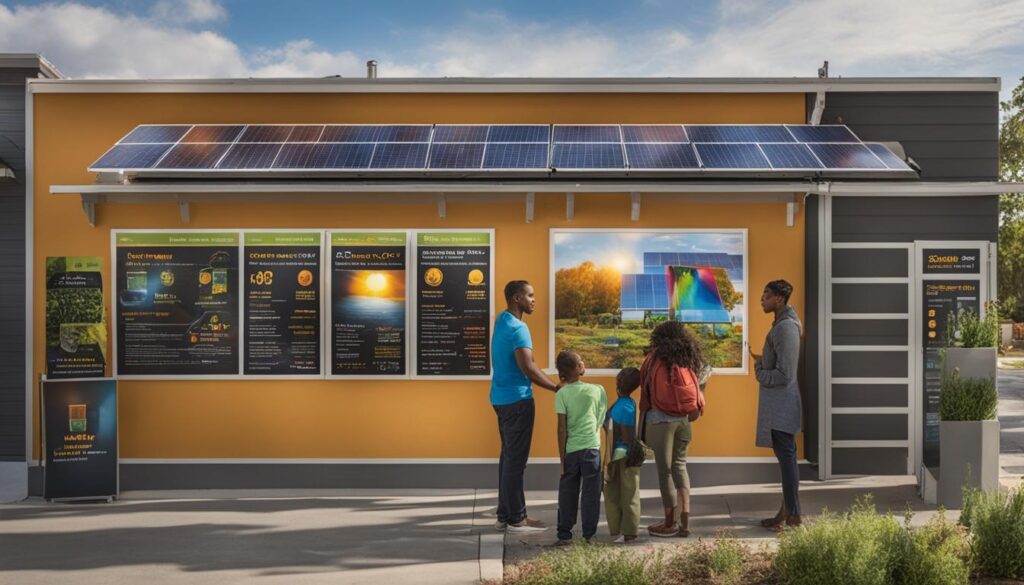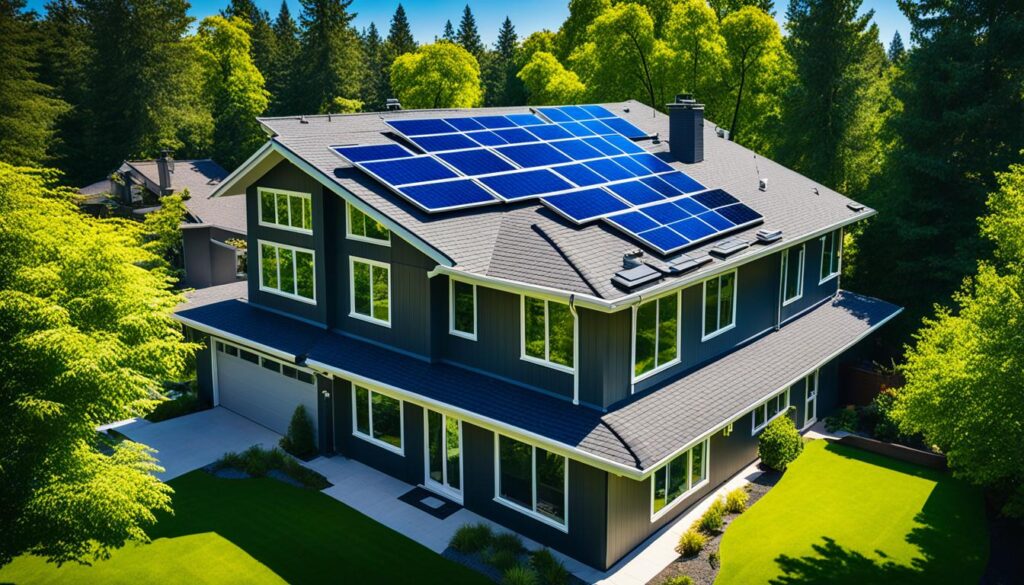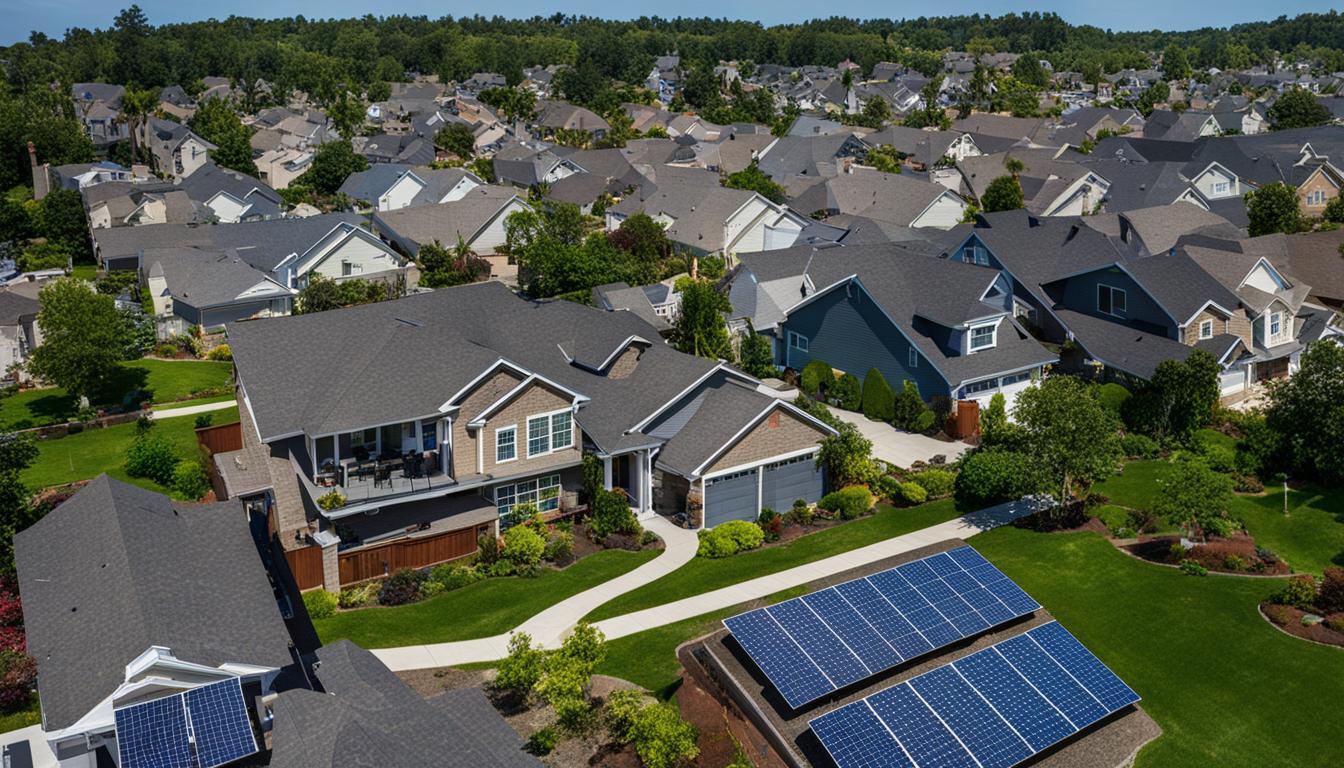Solar power is becoming increasingly popular and in high demand as a renewable energy source. If you’re looking to start a solar business, South Africa provides an ideal location. With its abundant sunshine and growing need for sustainable energy solutions, South Africa presents numerous opportunities for entrepreneurs like you.
When it comes to solar businesses, there are various avenues you can explore. From solar panel installation and product retail to consultancy and maintenance services, the possibilities are vast. However, before diving into the solar business landscape, it’s essential to understand the key considerations and steps involved to set yourself up for success.
In this solar business startup guide, we’ll walk you through everything you need to know in order to start and thrive in the solar industry in South Africa. We’ll cover the types of solar businesses, the requirements to get started, the costs involved, the profitability potential, and the industries that most need solar energy solutions. By the end of this guide, you’ll be equipped with the knowledge and insights to make informed decisions and pave your way to a thriving solar business venture.
Key Takeaways:
- South Africa offers a favorable environment for starting a solar business due to its high demand for renewable energy solutions.
- Types of solar businesses include panel installation, product retail, consultancy, maintenance, and rent-to-own models.
- Requirements for starting a solar business include expertise in solar technology, compliance with regulations, strategic partnerships, and a skilled workforce.
- The initial investment varies based on factors such as training, certification, equipment, marketing, and operational costs.
- Profitability depends on government incentives, energy demand, and the ability to innovate and adapt.
What is Solar Power?
Solar power is a form of renewable energy that is derived from the sun’s radiation. It can be harnessed through various technologies to generate electricity or provide heat for different applications. The sun emits energy in the form of electromagnetic radiation, including visible light, infrared, and ultraviolet rays. Solar power technologies capture and convert this solar radiation into usable forms of energy.
There are two primary ways solar power is commonly utilized:
- Solar photovoltaic (PV) technology: Solar photovoltaic systems convert sunlight directly into electricity through solar cells made of semiconductor materials like silicon. These solar cells, known as “PV cells,” generate an electric current when exposed to sunlight, allowing for the production of clean and sustainable electricity.
- Solar thermal technology: Solar thermal systems harness solar energy to produce heat, which can be used directly or converted into electricity through concentrated solar power (CSP) or solar water heating. In concentrated solar power systems, mirrors or lenses concentrate sunlight onto a receiver, which generates heat that can then be used to generate electricity. Solar water heating systems use sunlight to heat water for domestic or commercial use.
Different Types of Solar Businesses
Are you considering starting a solar business in South Africa? There are several types of solar businesses you can venture into, each offering unique opportunities.
Solar Panel Installation
Solar panel installation is the most common and straightforward business model in the solar industry. As a solar panel installer, you specialize in the installation of solar panels for residential, commercial, or industrial purposes. By offering high-quality installation services, you can help customers harness the power of the sun to meet their energy needs. Partnering with reputable solar panel manufacturers can ensure a steady supply of reliable products for your installations.
Solar Product Retail
Operating a solar product retail store is another lucrative option. Your store can offer a wide range of solar products, including solar panels, batteries, inverters, and solar-powered appliances. This allows customers to conveniently access all the necessary components for their solar energy systems in one place. By providing expert advice and guidance to customers, you can assist them in choosing the right products for their specific needs.
Solar Consultancy
If you have in-depth knowledge and expertise in the solar industry, starting a solar consultancy business can be a rewarding venture. As a solar consultant, you can offer expert advice and guidance to individuals and businesses interested in adopting solar energy solutions. This may include conducting energy audits, recommending appropriate solar systems, and guiding clients through the entire installation process. By providing valuable insights and personalized solutions, you can help clients make informed decisions about their solar investments.
Solar Maintenance and Repair
With the increasing adoption of solar energy in South Africa, there is a growing demand for solar maintenance and repair services. By specializing in solar maintenance and repair, you can ensure that installed solar systems continue to operate efficiently and effectively. This includes regular inspections, cleaning, troubleshooting, and repair services. Building a reputation for reliable and high-quality maintenance and repair work can lead to long-term customer relationships and consistent income.
Rent-to-Own Solar Business
A unique business model in the solar industry is the rent-to-own solar business. This model allows customers to lease solar systems with the option to purchase them in the future. This provides an affordable and accessible solution for individuals and businesses who cannot afford the upfront costs of purchasing solar equipment. By offering flexible payment plans and quality solar installations, you can make solar energy more accessible and attractive to a broader customer base.

Whether you choose to specialize in solar panel installation, solar product retail, solar consultancy, solar maintenance and repair, or the rent-to-own solar business, there are numerous opportunities in the South African solar market. Evaluate your skills, expertise, and interests to determine the best fit for your entrepreneurial journey. Remember, building a reputable brand, providing superior customer service, and staying updated with the latest solar technologies are keys to success in the solar industry.
Requirements to Start a Solar Business in South Africa
To start a solar business in South Africa, you need to fulfill certain requirements. First and foremost, you should possess knowledge and expertise in solar technology, installation processes, and the local regulatory environment. This knowledge will help you deliver high-quality services to your customers and ensure compliance with the necessary standards.
Investing in relevant certifications and training programs will enhance your credibility and demonstrate your commitment to providing top-notch services. It will also keep you up-to-date with the latest advancements in solar technology, allowing you to offer innovative solutions to your clients.
When it comes to legal compliance, there is no specific license required to start a solar business in South Africa. However, it is essential to be familiar with the country’s regulations relating to solar energy and ensure that your business complies with the technical and environmental guidelines.
Building strategic partnerships is another crucial aspect of starting a successful solar business. Collaborating with solar equipment suppliers, manufacturers, and other stakeholders in the renewable energy sector will ensure a reliable supply chain for your business. These partnerships can also provide you with valuable insights and support as you navigate the industry.
Finally, assembling a skilled workforce consisting of solar technicians, engineers, and salespeople is vital for the success of your solar business. These individuals will contribute to the smooth operation and growth of your business, enabling you to meet the needs of your customers effectively.
Cost of Starting a Solar Business in South Africa
The cost of starting a solar business in South Africa can vary depending on the type and scale of your operations. It is recommended to have at least R100,000 as startup capital to cover essential expenses.
The following factors contribute to the overall costs:
- Training and Certification: Investing in solar technology knowledge and certifications can ensure you provide high-quality services and meet industry standards.
- Business Registration and Licensing: Obtaining the necessary permits and licenses is vital to operate legally and protect your business.
- Equipment and Inventory: Acquiring solar panels, batteries, inverters, and other essential equipment is a significant expense for a solar business. Quality and reliable equipment are essential for long-term success.
- Marketing and Promotion: Promoting your business through various marketing channels, including online marketing, advertisements, and branding efforts, helps attract customers and build a strong reputation.
- Operational Costs: Rent, utilities, salaries, and other operational expenses are ongoing costs that need to be budgeted for to ensure smooth business operations.
By carefully planning and budgeting for these costs, you can establish a solid foundation for your solar business.

Having a clear understanding of the startup costs will help you make informed decisions and set realistic expectations as you embark on your solar business journey in South Africa.
Profitability of a Solar Business in South Africa
The profitability of a solar business in South Africa depends on several key factors. Firstly, government incentives play a significant role in shaping the financial outlook for solar businesses. Tax incentives and subsidies provided to renewable energy enterprises can have a substantial impact on the bottom line, making it worthwhile to explore and understand the specific qualifications required to benefit from these incentives.
In addition to government incentives, identifying industries and regions with high energy demand is crucial for maximizing profitability. By targeting areas where the traditional grid infrastructure is less reliable, solar solutions become increasingly appealing and can gain a competitive edge in the market. Industries such as agriculture, manufacturing, hospitality, and residential sectors are particularly lucrative segments with a high need for solar energy solutions.
Furthermore, staying updated on technological advancements is essential for the profitability of a solar business. By continuously adapting and incorporating innovative solutions into the business model, a company can enhance its competitiveness and meet the evolving needs of the market.
Key Points:
- Government incentives, such as tax incentives and subsidies, greatly impact the profitability of a solar business in South Africa.
- Identifying industries and regions with high energy demand is crucial for maximizing profitability.
- Staying updated with technological advancements and adapting the business model accordingly gives a competitive edge in the market.
Industries that Need Solar Energy
Certain industries have a high need for solar energy solutions due to their high energy consumption and potential cost savings. Solar power offers a sustainable and efficient alternative to traditional energy sources, making it an attractive option for agriculture, manufacturing, hospitality, and residential sectors.
Agriculture
Agriculture, particularly large-scale farming operations, requires substantial energy for irrigation, heating, and processing. Implementing solar energy solutions in agricultural practices can significantly reduce operational costs and contribute to sustainable farming practices.
Manufacturing
Manufacturing industries often have high energy demands for various processes and machinery. Integrating solar power into manufacturing operations can help reduce electricity costs and decrease reliance on fossil fuels, resulting in improved sustainability and cost savings.
Hospitality
The hospitality industry, including hotels and resorts, consumes significant amounts of energy to power facilities, lighting, heating, ventilation, air conditioning systems, and other amenities. Adopting solar energy solutions can help hospitality businesses reduce their carbon footprint and lower operational costs.
Residential
The residential sector presents a substantial market for solar energy solutions, with homeowners increasingly seeking sustainable and cost-effective ways to power their homes. Solar panels can provide clean and renewable energy, allowing homeowners to reduce their dependence on conventional electricity sources and lower their utility bills.
By leveraging solar energy solutions, these industries can not only reduce their environmental impact but also benefit from potential cost savings in the long run. Solar power offers a reliable and renewable energy source that can support sustainable growth and contribute to a greener future.

Market Research for Starting a Solar Business
Before diving into the solar business in South Africa, conducting thorough market research is crucial. Market research provides valuable insights into demographics, competitor analysis, regulatory environment, and customer needs and preferences. By understanding these factors, you can make informed decisions and tailor your offerings to meet specific market requirements.
Identifying Regions with High Potential: It is important to identify regions with a high potential for solar energy adoption. Factors such as sunlight hours, climate, and the economic status of the population can influence the demand for solar solutions. Conducting research on these factors can help you target the right areas and maximize your business opportunities.
Analyzing Existing Solar Businesses: Analyzing existing solar businesses in your target area can provide valuable insights. By studying their strengths, weaknesses, and customer reviews, you can identify opportunities for differentiation. This analysis can help you understand what sets your business apart and how you can position yourself in the market.
Understanding the Regulatory Environment: Understanding the regulatory environment is essential for compliance and success. Research the regulations related to solar energy and any incentives, rebates, or tax breaks offered by the government. This knowledge will help you navigate the legal landscape and take advantage of available benefits.
Surveying Potential Customers: Surveying potential customers is an effective way to understand their energy needs and preferences. By gathering insights directly from your target audience, you can tailor your offerings to meet their specific requirements. This customer-centric approach increases the likelihood of success and customer satisfaction.
Market research is an ongoing process and should be conducted at regular intervals to stay updated with the evolving market dynamics. By investing time and effort in market research, you can make informed decisions and position your solar business for success.
Running a Successful Solar Business
To run a successful solar business, it is essential to implement certain strategies and practices that will set your business apart from the competition. Here are some key aspects to focus on:
Prioritize Quality Service
Delivering high-quality products and services is crucial for customer satisfaction and building a positive reputation. Ensure that your solar systems are of the highest quality and installed correctly by skilled technicians. Offer excellent customer support and address any concerns promptly to maintain customer trust.
Educate Customers about Solar Energy
Customer education plays a vital role in fostering long-term commitment to solar solutions. Provide comprehensive information about the benefits of solar energy, cost savings, environmental impact, and available government incentives. By educating customers, you empower them to make informed decisions and choose sustainable energy solutions.
Invest in Effective Marketing and Branding
Developing a strong online and offline presence is crucial for attracting customers to your solar business. Showcase your expertise, the benefits of your products and services, and your commitment to sustainability. Invest in search engine optimization (SEO) techniques to improve your online visibility. Build a brand that reflects reliability, customer satisfaction, and a commitment to renewable energy.
Offer Maintenance Services
Setting your solar business apart from competitors can be achieved by offering post-installation maintenance services. Regular maintenance ensures that solar systems operate optimally and efficiently, providing customers with maximum benefits. By offering maintenance services, you reassure customers that you are committed to the long-term performance and durability of their solar systems.
By implementing these strategies and practices, you can cultivate a successful solar business that prioritizes quality service, educates customers, effectively markets the brand, and provides essential maintenance services.
Conclusion
Starting a solar business in South Africa provides a unique opportunity to enter the thriving renewable energy market. By leveraging your knowledge in solar technology and complying with regulations, you can establish a successful venture. To get started, you’ll need to invest in training, certifications, business registration, and essential equipment. Marketing and operational costs should also be considered in your initial investment.
Profitability in the solar industry is influenced by factors such as government incentives, the demand for clean energy, and innovation within the sector. Tailoring your services to industries like agriculture, manufacturing, hospitality, and residential can significantly enhance your chances of success, as these sectors have a high need for solar energy solutions.
Before launching your solar business, conducting thorough market research is essential. This will help you understand the demographics, competition, regulatory environment, and customer preferences. Delivering quality service, educating customers about the benefits of solar energy, implementing effective marketing strategies, and offering maintenance services are key elements of running a successful solar business in South Africa.
Despite the challenges, starting a solar business in South Africa can be a rewarding and profitable venture. As the demand for renewable energy continues to grow, there are abundant opportunities to make a positive impact while building a successful business.
FAQ
How can I start a solar business in South Africa?
To start a solar business in South Africa, you need knowledge and expertise in solar technology, legal compliance, strategic partnerships, and a skilled workforce.
What types of solar businesses can I start in South Africa?
You can start a solar panel installation business, a solar product retail store, a solar consultancy service, a solar maintenance and repair service, or a rent-to-own solar business.
What are the requirements to start a solar business in South Africa?
You need knowledge and expertise in solar technology, legal compliance with relevant regulations, strategic partnerships with suppliers and manufacturers, and a skilled workforce consisting of solar technicians, engineers, and salespeople.
How much does it cost to start a solar business in South Africa?
The initial investment can vary widely depending on factors such as training and certification, business registration and licensing, equipment and inventory, marketing and promotion, and operational costs.
Is a solar business profitable in South Africa?
The profitability of a solar business depends on government incentives, energy demand, and innovation and adaptation in the industry.
Which industries in South Africa need solar energy solutions?
Industries such as agriculture, manufacturing, hospitality, and residential sectors have a high need for solar energy solutions.
What market research should I conduct before starting a solar business?
It is important to conduct market research to understand demographics, competitors, the regulatory environment, and customer needs and preferences.
How can I run a successful solar business?
Running a successful solar business involves providing quality service, educating customers about the benefits of solar energy, effective marketing and branding, and offering maintenance services.
What are the benefits of starting a solar business in South Africa?
The benefits include diversification, long-term growth potential, positive impact on society, government incentives, and potential for cross-selling.
How can I contribute to the renewable energy industry in South Africa?
By starting a solar business, you can contribute to the growth of the renewable energy industry in South Africa and help reduce the country’s carbon footprint.




